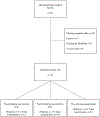Neurocognitive deficits may not resolve following pediatric kidney transplantation
- PMID: 36932049
- PMCID: PMC11001201
- DOI: 10.1111/petr.14505
Neurocognitive deficits may not resolve following pediatric kidney transplantation
Abstract
Background: Pediatric chronic kidney disease (CKD) patients are at risk for cognitive deficits with worsening disease progression. Limited, existing cross-sectional studies suggest that cognitive deficits may improve following kidney transplantation. We sought to assess cognitive performance in relationship to kidney transplantation and kidney-specific medical variables in a sample of pediatric kidney transplant patients who provided cross-sectional and longitudinal observations.
Methods: A retrospective chart review was conducted in patients who completed pre- and/or post-transplant neurocognitive testing at the University of Iowa from 2015-2021. Cognitive outcomes were investigated with developmentally appropriate, standardized measures. Mixed linear models estimated the impact of transplant status on cognitive function (z-scores). Subsequent post-hoc t-tests on change scores were limited to patients who had provided pre- and post-transplant assessments.
Results: Thirty eight patients underwent cognitive assessments: 10 had both pre- and post-transplant cognitive assessments, 11 had pre-transplant assessments only, and 17 had post-transplant data only. Post-transplant status was associated with significantly lower full-scale IQ and slower processing speed compared to pre-transplant status (estimate = -0.32, 95% confidence interval [CI] = -0.52: -0.12; estimate = -0.86, CI = -1.17: -0.55, respectively). Post-hoc analyses confirmed results from the mixed models (FSIQ change score = -0.34, 95% CI = -0.56: -0.12; processing speed change score = -0.98, CI = -1.28: -0.68). Finally, being ≥80 months old at transplant was associated with substantially lower FSIQ compared to being <80 months (estimate = -1.25, 95% CI = -1.94: -0.56).
Conclusions: Our results highlight the importance of monitoring cognitive function following pediatric kidney transplant and identify older transplant age as a risk factor for cognitive deficits.
© 2023 The Authors. Pediatric Transplantation published by Wiley Periodicals LLC.
Conflict of interest statement
Conflict of interest statements
There are no financial relationships to disclose or conflict of interest for the authorship team. The results presented in this paper have not been published previously in whole or part, except in an abstract format.
Figures



References
-
- NAPRTCS 2014 Annual Transplant Report, in North American Pediatric Renal trials and Collaborative Studies. 2014: Rockville, MD.
-
- Warady BA, Belden B, and Kohaut E, Neurodevelopmental outcome of children initiating peritoneal dialysis in early infancy. Pediatr Nephrol, 1999. 13(9): p. 759–65. - PubMed
-
- Qvist E, et al., Neurodevelopmental outcome in high-risk patients after renal transplantation in early childhood. Pediatr Transplant, 2002. 6(1): p. 53–62. - PubMed
MeSH terms
Grants and funding
LinkOut - more resources
Full Text Sources
Medical

